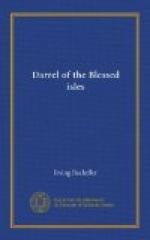“Some days,” said Darrel, “the soul in me is like a toy skiff, tossing in the ripples of a duck pond an’ mayhap stranding on a reed or lily. An’ then,” he added, with kindling eye and voice, “she is a great ship, her sails league long an’ high, her masthead raking the stars, her hull in the infinite sea.”
“Well,” said Trove, sighing, “I’m still in the ripples of the duck pond.”
“An’ see they do not swamp thee,” said Darrel, with a smile that seemed to say, “Poor weakling, your trouble is only as the ripples of a tiny pool.” They went on slowly, over green pastures, halting at a brook in the woods. There, again, they rested in a cool shade of pines, Darrel lighting his pipe.
“I envy thee, boy,” said the tinker, “entering on thy life-work in this great land—a country blest o’ God. To thee all high things are possible. Where I was born, let a poor lad have great hope in him, an’ all—ay, all—even those he loved, rose up to cry him down. Here in this land all cheer an’ bid him God-speed. An’ here is to be the great theatre o’ the world’s action. Many of high hope in the broad earth shall come, an’ here they shall do their work. An’ its spirit shall spread like the rising waters, ay, it shall flood the world, boy, it shall flood the world.”
Trove made no reply, but he thought much and deeply of what the tinker said. They lay back a while on the needle carpet, thinking. They could hear the murmur of the brook and a woodpecker drumming on a dead tree.
“Me head is busy as yon woodpecker’s,” Darrel went on. “It’s the soul fire in this great, free garden o’ God—it’s America. Have ye felt it, boy?”
“Yes; it is in your eyes and on your tongue,” said Trove.
“Ah boy! ‘tis only God’s oxygen. Think o’ the poor fools withering on cracker barrels in Hillsborough an’ wearing away ‘the lag end o’ their lewdness.’ I have no patience with the like o’ them, I’d rather be a butcher’s clerk an’ carry with me the redolence o’ ham.”
In Hillsborough, where all spoke of him as an odd man of great learning, there were none, saving Trove and two or three others, that knew the tinker well, for he took no part in the roaring gossip of shop and store.
“Hath it ever occurred to thee,” said Darrel, as they walked along, “that a fool is blind to his folly, a wise man to his wisdom?”
When they were through the edge of the wilderness and came out on Cedar Hill, and saw, below them, the great, round shadow of Robin’s Inn, they began to hasten their steps. They could see Polly reading a book under the big tree.
“What ho! the little queen,” said Darrel, as they came near, “Now, put upon her brow ‘an odorous chaplet o’ sweet summer buds.’”
She came to meet them in a pretty pink dress and slippers and white stockings.
“Fair lady, I bring thee flowers,” said Darrel, handing her a bouquet. “They are from the great garden o’ the fields.”




